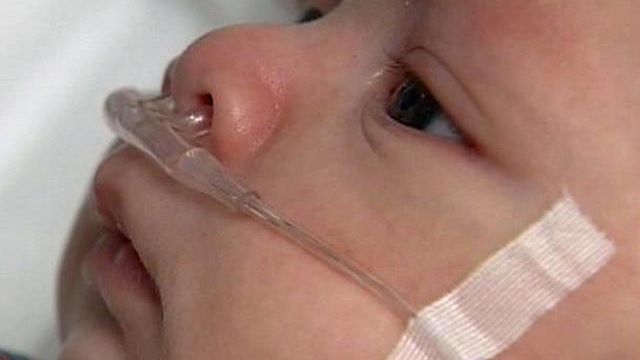Cold-like virus kills hundreds of children in U.S.
Respiratory Syncytial Virus – a severe, cold-like virus – sends 125,000 children to hospitals and kills about 500 each year in the United States.
Posted — UpdatedRespiratory syncytial virus usually infects children before the age of 2 – about 125,000 a year. About 500 of the children develop severe symptoms and die.
At first, the parents of Elijah Jackson thought their 6-month-old infant just had a runny nose.
"We thought it was just a little family cold that everybody had caught," his mother, Danielle Dupree said.
But his parents saw Elijah's symptoms grow worse. "His chest was rising really high and caving in," his father, Tunene Jackson, said.
"I called my doc, and they said, 'No, call 911," Dupree said.
Elijah was taken to WakeMed, where doctors helped him with breathing and feeding and worked to control his fever, which spiked to 103 degrees.
Elijah was one of a growing number of infants to have gotten RSV. Cases have reached an unusually high peak this winter, up to 50 percent higher than in 2007, WakeMed doctors said.
"Since December, we've had about 230 patients," Dr. Stephen Linenweber, a pediatrician at WakeMed, said.
RSV can be life-threatening for some children, especially those under 6 months old. Those more prone to respiratory problems – such as premature babies and those born with heart or lung problems or immune deficiencies – are more susceptible to RSV.
As children get closer to school age, their immune systems typically grow strong enough to fight off the virus.
The virus spreads in secretions, as do other viruses.
"Washing your hands is essential. Try to limit contact with each other this time of year," Linenweber said.
Parents should call their child's doctor when they notice symptoms, including labored breathing, a worsening cough, difficulty feeding or bluish lips or fingernails.
"Just the littlest cold can turn into the worst thing," Linenweber said.
• Credits
Copyright 2024 by Capitol Broadcasting Company. All rights reserved. This material may not be published, broadcast, rewritten or redistributed.





